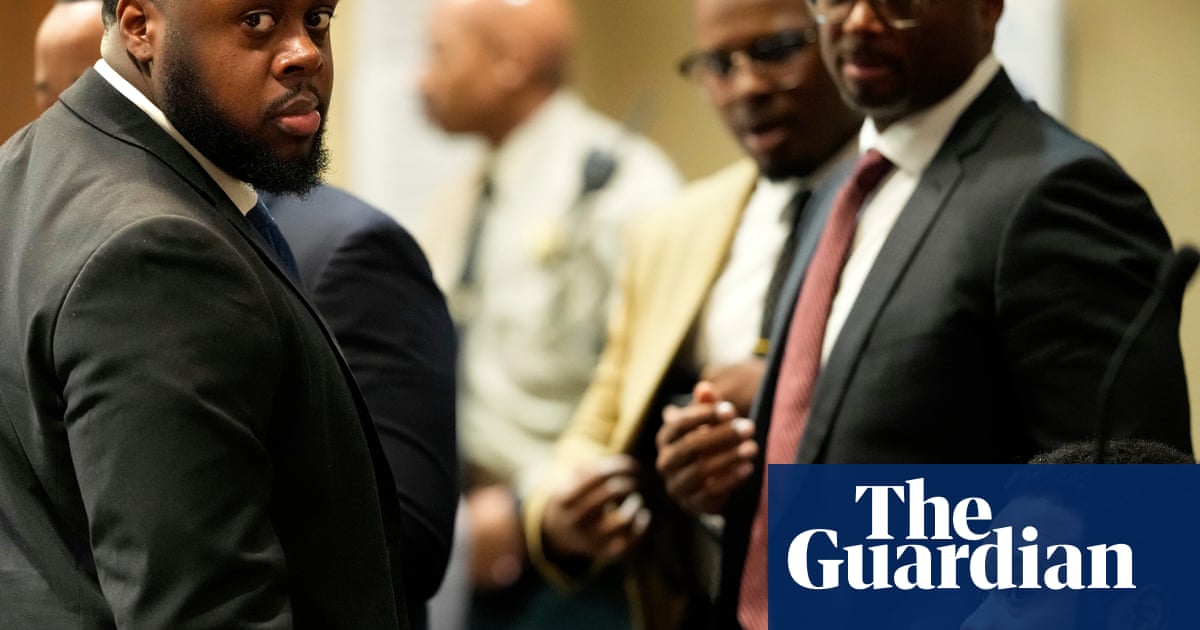Three formerMemphisofficers were acquitted on Wednesday of state charges, including second-degree murder, in the fatal beating ofTyre Nicholsafter he ran away from a traffic stop in 2023.
A jury took about eight and a half hours over two days to find Tadarrius Bean, Demetrius Haley and Justin Smith not guilty on all charges after a nine-day trial in state court inMemphis. After the jury’s verdict was read, the defendants hugged their lawyers as relatives of the former officers cried. One relative yelled: “Thank you, Jesus!”
The three defendants still face the prospect of years in prison after they wereconvictedof federal charges last year.
Nichols, a 29-year-old Black man, fled a traffic stop after he was yanked out of his car, pepper-sprayed and hit with a Taser. Five officers, who are also Black, caught up with him and punched, kicked and hit Nichols with a police baton, struggling to handcuff him as he called out for his mother just steps from his home. Nichols died on 10 January 2023, three days after the beating.
Footage of the beating captured by a police pole camera also showed the officers milling about, talking and laughing as Nichols struggled. His death led to nationwide protests, raised the volume on calls for police reforms in the US and directed intense scrutiny of police in Memphis, a majority-Black city.
Former Memphis officer Desmond Mills Jr, who was also charged in Nichols’s death, testified as a prosecution witness.
Mills and another officer involved in the beating, Emmitt Martin, have agreed to plead guilty to the state charges and did not stand trial under deals with prosecutors. They also pleaded guilty in federal court, where sentencing for all five officers is pending.
The officers had been charged with second-degree murder, aggravated assault, aggravated kidnapping, official misconduct and official oppression.
The officers were accused of using unnecessary force during the arrest of Nichols. They were frustrated, angry and full of adrenaline after Nichols fled the traffic stop, prosecutor Paul Hagerman said in opening statements.
They were “overcome by the moment”, the prosecutor said.
“Nobody is going to call them monsters,” Hagerman said. “It doesn’t take monsters to kill a man.”
Prosecutors argued that the officers used excessive, deadly force in trying to handcuff Nichols and were criminally responsible for each others’ actions. They also said the officers had a duty to intervene and stop the beating and tell medical personnel that Nichols had been hit repeatedly in the head, but they failed to do so.
Defense attorneys attempted to refute accusations that the officers used excessive force to subdue Nichols and followed police policies and standards. Defense attorneys have said the officer who acted with the most violence was Martin, who kicked and punched Nichols several times in the head but is not standing trial.
Mills testified that he regrets his failure to stop the beating, which led to Nichols’s death from blunt force trauma. Nichols suffered tears and bleeding in the brain, Dr Marco Ross, the medical examiner who performed the autopsy, said in court testimony.
As Nichols struggled with Bean and Smith, who were holding him on the ground, Mills tried to pepper-spray Nichols, but he ended up spraying himself, he said.
After stepping away to try to recover, Mills then walked up to Nichols and hit his arm three times with a police baton. Mills told prosecutor Paul Hagerman that he hit Nichols with the baton because he was angry over the pepper spray.
Mills acknowledged on the stand that he had a duty to intervene to stop the beating, but didn’t.
But Mills also said Nichols was actively resisting arrest and not complying with orders to present his hands to be cuffed.
During the trial, defense attorney John Keith Perry asked Mills if he would have struck Nichols with the baton if Nichols had just put his hands behind his back. Mills said no.
The defense also has suggested Nichols was on drugs, giving him the strength to fight off five strong officers. Some mushrooms containing the hallucinogenic psilocybin were also found in his car, a TBI agent testified. However, a toxicology report showed Nichols only had alcohol and a small amount of marijuana in his system.
Mills admitted Nichols never punched or kicked any of the officers.
Defense lawyers also claimed Bean and Smith could not see the strikes to Nichols’s head because they were blinded by pepper spray and had tunnel vision as they tried to restrain Nichols.
But prosecutors sowed doubt on that claim by pointing to comments the defendants made after the beating. According to footage from the scene, Bean said Nichols was “eating” the blows and Smith said they hit Nichols with “so many pieces”, or punches. Smith also said “hit him” and Haley said “beat that man,” prosecutor Tanisha Johnson said.
In December, the US justice department said a 17-month investigationshowedthe Memphis police department uses excessive force and discriminates against Black people.
